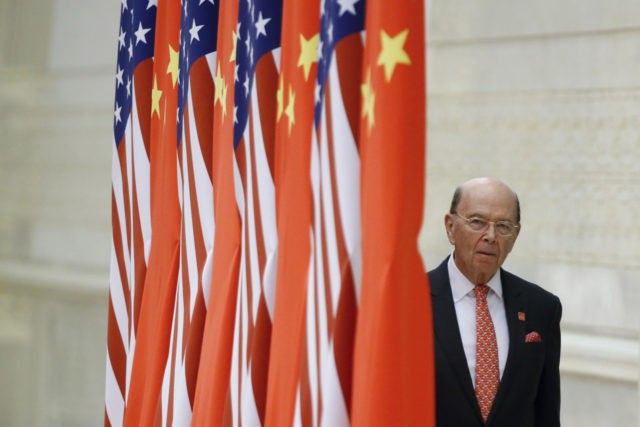President Donald Trump has no urgent need to reach a trade deal and is happy to continue with the tariffs against China, Commerce Secretary Wilbur Ross said on Tuesday.
Ross’s comments came shortly after President Trump said in London that a trade deal with China might have to wait until after the 2020 elections.
“I think it is also important that the president make clear that he is under no time pressure to get it done,” Ross said in an interview on CNBC’s “Squawk on the Street” program. “Because otherwise there is a tendency for the other side to say ‘Oh, he needs it for political reasons so we’ll give him a worse deal than we would have.’ He’s not going to play that game.”
Many stories in the U.S. and international media have speculated, without evidence, that Trump could feel pressure to announce a “win” by striking a deal with China before the 2020 election or to distract from the impeachment proceedings.
But that is not the view inside the White House. Many Trump adminstration officials are aware that an unsatisfactory deal would be seen as a sign of weakness by his political opponents and used to attack his trade agenda as misguided. It would also likely alienate his economic nationalist supporters. Trump himself has frequently said he does not think he needs a deal before the election.
The ‘Trump needs a deal’ narrative has taken hold of the minds of top Chinese officials, however, and may have prompted their recent turn toward insisting that a ‘phase one’ trade deal include an immediate rollback of tariffs already put in place–rather than just a time-out in imposing new tariffs or hiking existing levies.
“Trump has more of an urgent need for a trade agreement for his re-election while the US economy shows signs of recession and conflict between the two parties,” a former Chinese vice minister of commerce wrote in a Global Times op-ed this weekend.
Ross said this was a mistake.
“The president’s objective always has been to get the right deal, independently of when,” Ross said. “If we do not have a deal, he’s perfectly happy to continue with the tariff that we have. He feels we’re in a pretty good position one way or another.”
Many investors and market-watchers had been expecting that the tariffs scheduled to be applied on December 15 would be delayed as part of the phase one deal. But with the deadline fast approaching, it grows unlikely that any deal will be reached before then.
Ross was coy when asked directly about whether investors should expect that tariffs to kick-in on December 15. He seem to say the tariffs would still be applied unless there is substantial progress in the talks and an agreement is close-at-hand.
“There is always a chance for a break-through. I agree with the president that the Chinese want a deal. We want a deal. But it has to be a deal that is appropriate,” Ross said.
But when asked what would qualify as a break-through, Ross indicated a very high bar.
“We won’t have a break-through until it is in black-and-white, on paper, signed, sealed, and delivered,” Ross said.
That seems unlikely, given that no high level talks are scheduled.
“There is constant engagement at the staff level and that will continue. There’s no big meeting scheduled right now. And there certainly is no signing date scheduled,” Ross said.
Ross also offered an explanation for why the adminstration announced that it had reached the outline of phase one deal back in October.
“What we had was an agreement at 40,000 foot level. Forty to 50 billion of agricultural purchases, things like that,” Ross said. “But going from there to what will it actually be, what will be the products, how do you deal with pricing, how do you deal with market conditions, how do you deal with the contingency that they do not perform? Those are all questions that you don’t deal with at the 40,000 foot level but you must deal with to make a real deal.”
Keeping such an agreement confidential would have been unwise, Ross said. It is better for markets and the U.S. economy for the administration to be as transparent as possible, he argued.
CNBC reporter Leslie Picker asked if the U.S. would be at a disadvantage in negotiations after the 2020 election because Xi Jinping has been named president for life while President Trump, even if re-elected, will only have four years.
“We have the leverage because we have much more ammunition against them than they have against us. It’s one of the few good things about a trade deficit is you have more bullets you can fire than they have that they can fire. They’re pretty well out of bullets,” Ross said.

COMMENTS
Please let us know if you're having issues with commenting.